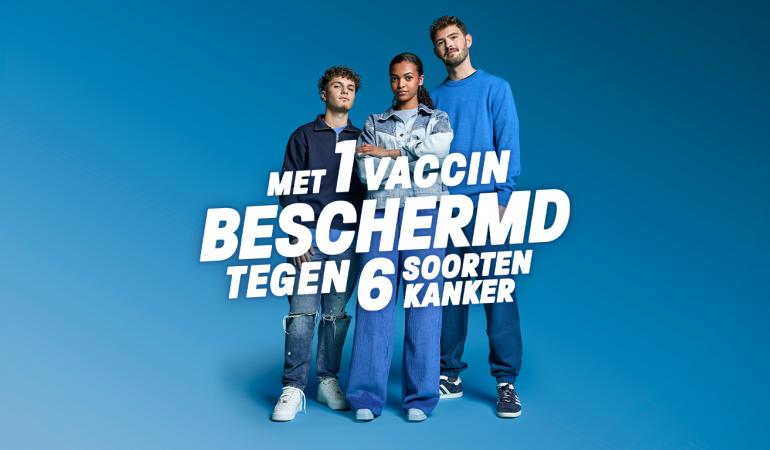
This spring, more than 800,000 young people received an invitation to be vaccinated against HPV, the human papillomavirus. Almost half of the 9 and 10-year-olds came to get their first vaccination this spring. From the end of August onwards, they will be able to obtain their next or last HPV vaccination. Young people who did not get the vaccination this spring will be given another opportunity to do so. Boys received an invitation for the first time this year.
Catch-up campaign
HPV can cause cancer in women and men at a later age. Eight out of ten people become infected with HPV once or more in their lives. Since 2010, the HPV vaccination has been offered to girls in the year in which they turn 13 as part of the National Immunisation Programme. This year, the vaccination age has been reduced to the year they turn ten.
Catch-up campaign
In order to also give boys the opportunity to protect themselves against HPV, an extensive catch-up campaign is taking place this year, which will continue next year as well. Boys born in 2004, 2006, 2008, 2009 and 2012 received an invitation this spring, as did girls from these years who had not yet been vaccinated against HPV.
Teenagers born in 2005, 2007, 2010, 2011 and 2013 will be invited at the beginning of 2023.
Turnout figures
The minimum turnout this spring ranged from 33.8% among boys born in 2004 to 45.5% among boys born in 2008. Of the boys born in 2012, at least 42.8% got the vaccination. Of the girls born in 2012, at least 49.2% have had their first HPV vaccination.
The turnout is actually higher, but it cannot be determined precisely because some of the parents and young people did not give their consent to share vaccination data containing personal data with RIVM. As a result, approximately 10% of the vaccinations are received anonymously, and in these cases, RIVM is not aware whether they are boys or girls or in which year they were born. These figures for each year of birth and gender are therefore an underestimation of the actual figures.
The turnout for the first HPV vaccination was around 60% halfway through previous years, with the exception of 2020, when the group vaccinations were postponed in the spring due to COVID-19. Jeanne-Marie Hament, programme manager of the National Immunisation Programme, is optimistic: ‘The HPV vaccination is new for boys. As a result, some young people and their parents need more time to reach a decision. In addition, the invitation for the HPV vaccination coincided almost exactly with the invitation for a coronavirus vaccination. For those who were unwilling or unable to get the vaccination this spring, there will be another opportunity this autumn to protect themselves against HPV.’
HPV-related cancer
The human papillomavirus can cause cancer in the oral and pharyngeal cavity, anus, labia, vagina, cervix and penis at a later age. An estimated 1,100 women and 400 men in the Netherlands develop cancer as a result of HPV every year. Around 5,500 women are diagnosed with ‘pre-cervical cancer‘ each year.
Help with making choices about HPV
For parents and young people who want to know more about HPV and the vaccination, RIVM also offers guidance in addition to the information on the National Immunisation Programme website. www.hpvkeuzehulp.nl offers a great deal of information and can help people to weigh up the various vaccination considerations.